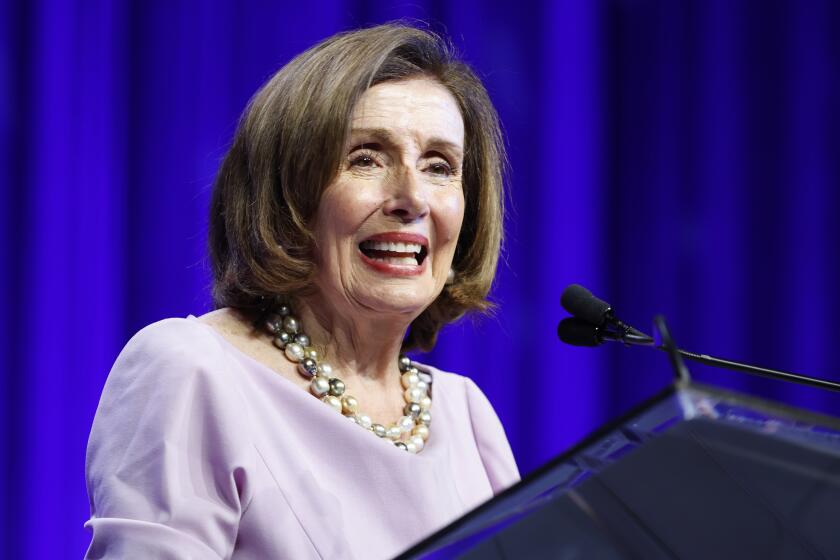Thomas Seems Sure to Face Criticism on EEOC Policies
For nearly eight stormy years, Clarence Thomas had the unenviable job of enforcing civil rights laws for an Administration that did not want them.
He weathered tough attacks from liberals and backroom pressure from conservatives as he stuck to his own sharply articulated views of what constitutes discrimination and how to remedy it in the workplace.
Now that the black appeals court judge has been nominated to the Supreme Court, his record as chairman of the Equal Employment Opportunity Commission and his opposition to racial quotas seem certain to cause some controversy at his confirmation hearings.
Liberal Democrats and civil rights groups will repeat long-standing charges that Thomas failed to aggressively enforce anti-discrimination laws as part of a Ronald Reagan Administration attempt to weaken job protections for minority members, women and the elderly.
“As chairman of the EEOC, Clarence Thomas failed to demonstrate a commitment to civil rights and liberties,” said Nan Aron of the liberal Alliance for Justice.
His defenders, and no doubt Thomas himself when he appears at Senate confirmation hearings, will respond that he transformed a troubled agency into an efficient organization that assisted real victims of discrimination.
Along the way, say some in the nominee’s camp, he resisted Administration efforts to push him into becoming a cheerleader for rolling back the nation’s civil rights laws.
“People in the Administration were very disappointed that he wasn’t out there criticizing the Supreme Court and trying to push legal opinions further,” said Fred Alvarez, a San Francisco labor lawyer who served as an EEOC commissioner with Thomas from 1984 to 1987.
Although he refused to identify them, Alvarez said that on several occasions officials pressured Thomas to be more outspoken in support of the Administration’s views on civil rights. R. Gaull Silberman, vice chairman of the EEOC, agreed, saying, “There was certainly pressure on him.”
Not that Thomas was shy about voicing his views on civil rights. He wrote numerous articles and engaged in combative exchanges with congressmen as he defended the way he ran the EEOC and his own conservative views on how to deal with discrimination.
Clearly, Thomas’ personal view that racial quotas and affirmative-action programs patronize blacks shaped his governing of the EEOC. His philosophy led to clashes with Congress and special interest groups.
Thomas is credited widely with improving morale and efficiency at the agency, where he was chairman of the five-member commission from 1982 to 1990. But he was best known for the radical shifts he instituted in the agency’s tactics for enforcing anti-discrimination laws.
For instance, before his arrival, the agency typically settled a large number of cases and prosecuted very few to the end. Under Thomas, enforcement concentrated on prosecuting suits in every case in which discrimination could be proved.
That policy led to a dramatic increase in the backlog of cases, and it caused a major controversy when it was discovered that the two-year statute of limitations had expired on more than 10,000 age-discrimination complaints filed with the commission.
Senior citizen groups were outraged, and Thomas was subjected to stinging criticism from Congress.
In addition, Thomas was rebuked by 43 congressmen when he abandoned the agency’s traditional reliance on class-action lawsuits in favor of individual cases. In a clear manifestation of Thomas’ philosophy, the switch represented a move away from the notion that classes of people are affected by discrimination and an emphasis on individual cases in which discrimination has been proven.
“I continue to believe that distributing opportunities on the basis of race or gender, whoever the beneficiaries, turns the law against employment discrimination on its head,” he wrote in a 1987 Yale Law Review article. “Class preferences are an affront to the rights and dignity of individuals.”
As part of the move away from class-action suits, employers found guilty of discrimination were no longer required to establish goals and timetables for hiring more workers from the affected group, such as blacks or women.
The goals issue was debated hotly within the commission. But Thomas prevailed by arguing that workers not affected directly by discrimination should not be helped.
However, when the Supreme Court issued three rulings in 1986 approving the use of goals and timetables, Thomas said that the EEOC would abide by the decisions.
“The Supreme Court has ruled and, as far as I am concerned, that is that,” he said at the time.
In instances in which individual discrimination was proven, the EEOC adopted tough regulations for punishment and remedies. For the first time, employers were required to hire workers who had been victims of discrimination, even if it meant firing someone already in the job.
Despite the persistent controversy and objections by such groups as the Black Leadership Forum and the American Federation of Government Employees, Thomas was approved for a second term at the EEOC helm in 1986 by a 14-2 committee vote and unanimous consent in the full Senate.
Although most criticism of Thomas was based on philosophical grounds, near the end of his tenure he came under fire for allegedly retaliating against a senior career employee who had criticized his policies in testimony before Congress.
In 1988, the St. Louis district director, Lynn Y. Bruner, told Congress that EEOC headquarters had ignored her warnings about the building backlog of age-discrimination complaints.
The first day she was back in her office, Bruner said, she was visited by an EEOC official from Washington who said that Bruner was “in trouble” because of her testimony and was in danger of not being around much longer.
Not long after, she was ordered demoted and transferred. After a lengthy dispute with Rep. Tom Lantos (D-San Mateo) and other congressmen, Thomas agreed to permit Bruner to remain in her position. But Thomas continued to deny retaliating against Bruner.
“I don’t play the race game,” Thomas told a House hearing on the matter two years ago. “I don’t play the sex game. I don’t get into people’s personal affairs. I am used to having terrible things said about me.”
More to Read
Get the L.A. Times Politics newsletter
Deeply reported insights into legislation, politics and policy from Sacramento, Washington and beyond. In your inbox three times per week.
You may occasionally receive promotional content from the Los Angeles Times.






